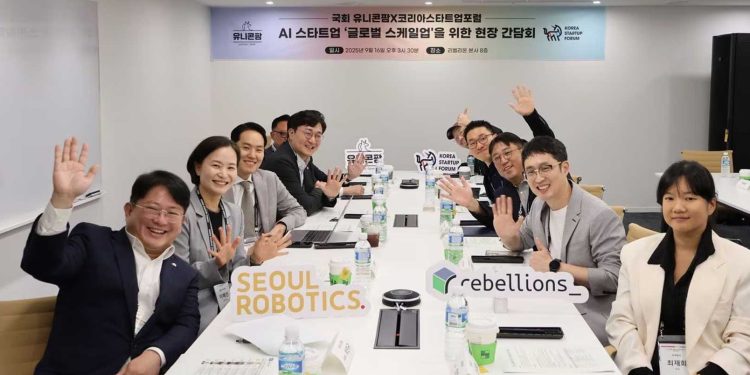With the fierce race in the international markets, Korea’s startup founders unveil regulatory bottlenecks and limited policy support risk undermining their ability to thrive among global competitors. At a National Assembly–startup roundtable in Seongnam, leaders from established Korean startups highlighted how foreign capital barriers and fragmented government support are leaving high-growth companies vulnerable, just as they face competition with global giants like Nvidia.
Korea’s Startup Leaders and Lawmakers Meet in Seongnam
On September 16, 2025, Unicorn Farm, a bipartisan National Assembly study group, and the Korea Startup Forum (KOSPO) co-hosted a policy roundtable at Rebellions’ headquarters in Seongnam, Gyeonggi Province.
Lawmakers in attendance included Democratic Party Reps. Kim Han-kyu, Jang Cheol-min, Kim Sung-hoe, Park Min-gyu, Korea Innovation Party Rep. Lee Hae-min, and People Power Party Rep. Ko Dong-jin.
Startup leaders included Park Sung-hyun (CEO, Rebellions), Lee Han-bin (CEO, Seoul Robotics), Choi Jae-hwa (CEO, Bunjang), Chung Min-chan (CEO, CUBIG), and Han Sang-woo (Chair, Korea Startup Forum).
Founders Warn of Policy Gaps in Scale-Up Stage
Participants stressed that Korea’s startup support framework is skewed toward early-stage firms, leaving established startups and unicorns with limited channels for state-level engagement.
Park Sung-hyun, CEO of Rebellions, said:
“Once a company surpasses KRW 1 trillion in valuation, it is labeled a unicorn but loses government attention because it is seen as having already received support. We are competing against Nvidia, with a market cap of USD 6 trillion, yet unicorns valued between KRW 1 trillion and 5 trillion are forced to rely on foreign capital in a distorted structure.”
Park emphasized that government backing should strengthen once startups reach global expansion stages, while smaller firms in the KRW 10–20 billion range should be supported primarily by private investors.
A Call for Globalized Capital Pathways
Other founders pointed to structural hurdles in Korea’s venture capital ecosystem.
Choi Jae-hwa, CEO of Bunjang, noted:
“Global firms like Airbnb secured private equity investments just before going public. Korea must also globalize not just venture capital but private equity’s role in scaling innovative companies.”
Foreign investment processes were cited as a major pain point.
Lee Han-bin, CEO of Seoul Robotics, said:
“It takes over six months and more than 50 documents for a foreign investor to open a Korean securities account. One Hong Kong investor even had to fly to Seoul to submit paperwork in person. These procedures are far from global standards.”
Regulatory Burdens Beyond Capital
Startups also highlighted how regulatory bottlenecks are hindering innovation in emerging fields.
Chung Min-chan, CEO of CUBIG, explained:
“We develop AI-based synthetic data analysis, but domestic projects are stalled due to restrictions from the Personal Information Protection Commission.”
Choi Jae-hwa added that second-hand exports face disadvantages:
“The cross-border e-commerce market is growing with K-content’s global reach, but when used goods are exported, we cannot access tax deductions. This weakens our competitiveness.”
Korea’s Startup Crossroads: Policy Gaps vs. Global Ambitions
These discussions underline a structural challenge in Korea’s startup journey: government policy and regulatory frameworks are optimized for early-stage growth but not for scale-up or global expansion.
Without easing foreign investment bottlenecks and modernizing regulations, unicorns risk depending excessively on overseas capital, potentially diluting Korea’s ownership of its innovation economy.
The contrast with U.S. and European ecosystems—where late-stage private equity and simplified cross-border investment structures support startups before IPO—shows why Korea must recalibrate its policies. With global capital markets demanding speed and flexibility, Korea’s slow procedures could divert high-potential companies abroad.
The Road Ahead: Aligning Korea’s Startup Capital, Regulation, and Global Scale
The Seongnam roundtable signals a growing consensus: Korea’s startups must be treated not as beneficiaries of state charity, but as core economic players. Lawmakers pledged to review the concerns raised, including foreign investment procedures, tax policies, and regulatory burdens.
For Korea’s startup ecosystem to remain competitive, the next phase of reform must focus on scale-up capital pathways, regulatory agility, and global alignment. Without these, Korea risks losing both capital inflows and innovation leadership at the moment its startups are poised for global impact.
– Stay Ahead in Korea’s Startup Scene –
Get real-time insights, funding updates, and policy shifts shaping Korea’s innovation ecosystem.
➡️ Follow KoreaTechDesk on LinkedIn, X (Twitter), Threads, Bluesky, Telegram, Facebook, and WhatsApp Channel.






